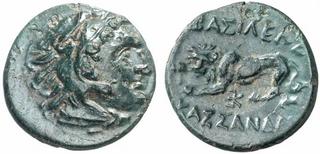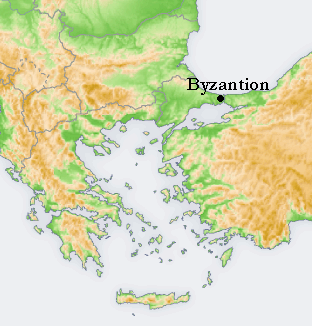This article concerns the period 319 BC – 310 BC.

This article concerns the period 309 BC – 300 BC.
Year 319 BC was a year of the pre-Julian Roman calendar. At the time, it was known as the Year of the Consulship of Cursor and Cerretanus. The denomination 319 BC for this year has been used since the early medieval period, when the Anno Domini calendar era became the prevalent method in Europe for naming years.

Antigonus I Monophthalmus was a Macedonian Greek general and successor of Alexander the Great. A prominent military leader in Alexander's army, he went on to control large parts of Alexander's former empire. He assumed the title of basileus (king) in 306 BC and reigned until his death. He was the founder of the Antigonid dynasty, which ruled over Macedonia until its conquest by the Roman Republic in 168 BC.

Cassander was king of the Ancient Greek kingdom of Macedonia from 305 BC until 297 BC, and de facto ruler of southern Greece from 317 BC until his death.

Antipater was a Macedonian general, regent and statesman under the successive kingships of Philip II of Macedon and his son, Alexander the Great. In the wake of the collapse of the Argead house, his son Cassander eventually ruled Macedonia as a king in his own right.

The Battle of Ipsus was fought between some of the Diadochi in 301 BC near the town of Ipsus in Phrygia. Antigonus I Monophthalmus, the Macedonian ruler of large parts of Asia, and his son Demetrius were pitted against the coalition of three other successors of Alexander: Cassander, ruler of Macedon; Lysimachus, ruler of Thrace; and Seleucus I Nicator, ruler of Babylonia and Persia.

The Diadochi were the rival generals, families, and friends of Alexander the Great who fought for control over his empire after his death in 323 BC. The Wars of the Diadochi mark the beginning of the Hellenistic period from the Mediterranean Sea to the Indus River Valley.

The Wars of the Diadochi or Wars of Alexander's Successors were a series of conflicts fought between the generals of Alexander the Great, known as the Diadochi, over who would rule his empire following his death. The fighting occurred between 322 and 281 BC.
Polyperchon, was a Macedonian Greek general who served both Philip II and Alexander the Great and then played an active role in the ensuing battles for control between Alexander's generals.

Battle of Gabiene was the second great battle between Antigonus Monophthalmus and Eumenes, two of Alexander the Great's successors. The battle was fought near Gabiene in Persia in the winter of 316-315 BC and ended the Second War of the Diadochi. It established Antigonus as the most powerful of the successors.
Telesphorus was a nephew and a general in the service of Antigonus Monophthalmus, the ruler and later king of the Asian half of the empire conquered by Alexander the Great, who was sent by him in 312 BC, with a fleet of fifty ships and a considerable army to the Peloponnese, to oppose the forces of Polyperchon and Cassander. At first he was very successful; he drove Polyperchon’s garrisons from all the cities of the peninsula, except Sicyon and Corinth, which were held by Polyperchon himself; but having joined with Antigonid admiral Medius in an attempt to relieve Oreus on Euboea, to which Cassander had laid siege, he was beaten back, with the loss of several ships. The following summer, Antigonus having conferred the chief direction of the war in the Peloponnese upon his other nephew Ptolemy, Telesphorus was so indignant that he shook off his allegiance, and having induced some of his soldiers to follow him, established himself in Elis on his own account, and even plundered the sacred treasures at Olympia. He was, however, soon after, induced by Ptolemy to submit. Antigonus must have forgiven him because a few years later Telesphorus was on the staff of Demetrius, Antigonus’ son.
Cleitus (Clitus) the White was an officer of Alexander the Great surnamed "White" to distinguish him from Cleitus the Black. He is noted by Athenaeus and Aelian for his pomp and luxury, and is probably the same who is mentioned by Justin among the veterans sent home to Macedonia under Craterus in 324 BC.
Nicanor was a Macedonian officer who served the Diadochus Cassander and the son in law of Aristotle. He campaigned on Cassander's behalf in Attica and Hellespont during the early Wars of the Diadochi, but was executed by Cassander after the latter suspected him of plotting a coup.
Alexander was a son of Polyperchon, the regent of Macedonia, and an important general in the Wars of the Diadochi.
Aristodemus of Miletus was one of the oldest and most trusted friends of Antigonus Monophthalmus. He is described by Plutarch as an arch-flatterer of Antigonus. Antigonus frequently used him on important diplomatic missions and occasionally entrusted him with military commands as well.
The Partition of Triparadisus was a power-sharing agreement passed at Triparadisus in 321 BC between the generals (Diadochi) of Alexander the Great, in which they named a new regent and arranged the repartition of the satrapies of Alexander's empire among themselves. It followed and modified the Partition of Babylon made in 323 BC upon Alexander's death.
The Second War of the Diadochi was the conflict between the coalition of Polyperchon, Olympias and Eumenes and the coalition of Cassander, Antigonus, Ptolemy and Lysimachus following the death of Cassander's father, Antipater.
The Battle of Orkynia was fought in 319 BCE near Orkynia in Cappadocia. It was one of first battles of the wars between the successors to Alexander the Great, the so called Diadochi. At Orkynia the armies of Antigonus Monophthalmus and Eumenes the Cardian met; the battle resulted in a stunning Antigonid victory.

The Battle of Byzantium (Byzantion) was a 317 BC engagement between the generals Antigonus Monopthalmus and Cleitus the White, during the Second War of the Diadochi. Fought over the course of two days, near Byzantium at the Hellespont, it resulted in a stunning Antigonid victory.






